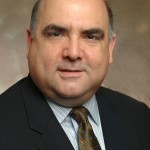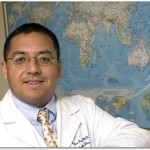One of the most exciting areas in the treatment of pediatric extremity sarcomas is the development of expandable implants and a procedure that uses magnets to treat sarcoma of bone and soft tissue.
The latest devices allow lengthening of the bone using a non-invasive technique with a simple magnet held against the patient’s leg, which preserves the patient’s own joint. These implants can be expanded and grow with the patient as they get taller without multiple operations.
The patient’s leg is put through a round magnet every few months and, using different settings, the physician can turn the magnet on and patients can watch their leg get longer. There are only a few centers in the country performing this procedure – Emory Musculoskeletal Oncology and Limb Reconstruction Center is the only center in Georgia that offers this treatment.
David K. Monson, MD, Emory assistant professor of orthopaedic surgery, and Shervin V. Oskouei, MD, Emory assistant professor of orthopaedic surgery, lead the Emory Musculoskeletal Oncology and Limb Reconstruction Center.
Monson’s focus is on rare tumors, sarcomas of the bone and soft tissue as well as other uncommon benign bone and soft tissue tumors. He also treats metastatic cancers that have spread to areas of the bone from other primary malignancies, and often performs complex reconstructive procedures for these disorders not available in the community. Oskouei is an expert in the treatment of musculoskeletal (extremity) tumors, total hip and total knee replacements and revisions. His specialty is in orthopaedic oncology.
Monson and Oskouei point to the advantages of the procedure:
- The procedure can save the patient’s limb by avoiding amputation.
- The procedure can be done in one operation so patients don’t have to make multiple trips to the operating room, using one implant that can be expanded as the patient grows.
- It allows lengthening of the bones and maintains an equality in limb length.
- The technique is noninvasive and can be done in the office using just a mild anesthetic, rather than general anesthesia.
- The procedure can be done more frequently, allowing physicians to lengthen in much smaller increments, which is much safer and more comfortable for the patient.
- The procedure provides patients improved function — patients are able to put their full weight on their leg immediately after surgery
Learn more from patient Ned Crystal or visit Emory Healthcare.








 There’s a place in Midtown Atlanta called the
There’s a place in Midtown Atlanta called the 




